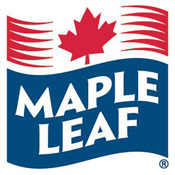I got an e-mail from the vice-president of communications for Maple Leaf Foods on Saturday afternoon.
She was sending me a blog that her boss, Michael McCain wrote, about his new knowledge of listeria and the role of food safety inspectors.
(1).jpg) I figure she’s making at least $150,000 to do her vp communicating, so, even though I was a dick, I felt OK responding,
I figure she’s making at least $150,000 to do her vp communicating, so, even though I was a dick, I felt OK responding,
“Thanks for forwarding this in a timely manner. I blogged about it yesterday.”
It was about 24 hours earlier.
And while McCain and Maple Leaf go about enhancing their communications reputations, even the mother country, land of the cook-your-turkey-till-it’s-piping-hot advice, has decided listeria is a problem, maybe we can’t rely on manufacturers, maybe listeria is everywhere like Michael McCain says, so maybe we better tell old people they could be at risk.
The U.K. Food Standards Agency commissioned a bunch of research and figured out that people over the age of 60 are more likely to take risks with ‘use by’ dates than younger people and that eating food like cold-cuts beyond its ‘use by’ date increases the risk of food poisoning from listeria.
A recent sharp rise in the number of people taken ill with listeria has seen more older people affected. The number of cases rose by 20% in 2007 and has doubled since 2000, this increase occurring predominantly among people over 60.
The number of cases of listeria in people over 60 years of age has doubled in the past nine years. And one in three of the people who get food poisoning caused by listeria die as a result.
Listeria is a type of food poisoning bacteria that can live and grow in a wide range of food – chilled ready-to-eat food in particular – for example pâté, cooked sliced meats, certain soft cheeses and smoked fish.
Dr Andrew Wadge, Chief Scientist at the FSA, said,
The rise in listeria food poisoning among older people is worrying. Listeria can make people very ill, and 95% of cases end up needing treatment in hospital.
‘There are some really simple steps people can take to prevent getting ill in the first place: be aware that ‘use by’ dates indicate how long food will remain safe, and then make sure you stick to them; always follow the storage instructions on the label; and make sure your fridge is cold enough – between 0°C and 5°C is ideal.
‘These are the three messages that our new campaign is focusing on and Food Safety Week is a good time to be raising awareness of them."
VP communications thingy: stop sending me e-mails that you or any of your underlings – and I know how many people at Maple Leaf subscribe to bites.ksu.edu and barfblog.com – know was repetition and maybe work on an information strategy so that the genius dieticians in Canadian old-folks homes stop serving unheated cold-cuts to their patients. That’s how 22 people died last year.

.jpg) "What is very important to recognize about bacteria is that you cannot see it. We wish you could visually inspect for bacteria, but it can’t be seen with the eyes, tasted or touched."
"What is very important to recognize about bacteria is that you cannot see it. We wish you could visually inspect for bacteria, but it can’t be seen with the eyes, tasted or touched.".jpg) In front of a parliamentary subcommittee Wednesday, the medical health officers for Ontario and the City of Toronto chastised the Canadian Food Inspection Agency for its handling of last summer’s listeriosis outbreak.
In front of a parliamentary subcommittee Wednesday, the medical health officers for Ontario and the City of Toronto chastised the Canadian Food Inspection Agency for its handling of last summer’s listeriosis outbreak.(1)(1).jpg) “Help us to help you! Give me your views on listeriosis.”
“Help us to help you! Give me your views on listeriosis.” I first learned from a
I first learned from a 
.jpg) Canadian parliamentarians, stop being swooned by this guy.
Canadian parliamentarians, stop being swooned by this guy. .jpg) The good news is that the report has a basic timeline of who knew what when, at least from the perspective of Ontario bureaucrats. By Aug. 1, 2008, the Ontario “Public Health Division identifies 16 cases of listeriosis in the month of July: the majority were in elderly people who had been in a long-term care home or hospital.”
The good news is that the report has a basic timeline of who knew what when, at least from the perspective of Ontario bureaucrats. By Aug. 1, 2008, the Ontario “Public Health Division identifies 16 cases of listeriosis in the month of July: the majority were in elderly people who had been in a long-term care home or hospital.” Until today.
Until today. Maple Leaf, seriously, you need better writers.
Maple Leaf, seriously, you need better writers..jpg) Me thinks he was talking about Maple Leaf Foods, a Canadian company doing $5.5 billion a year in sales that decided it needed a chief food safety officer after killing 21 people with its listeria-laden deli meats last fall.
Me thinks he was talking about Maple Leaf Foods, a Canadian company doing $5.5 billion a year in sales that decided it needed a chief food safety officer after killing 21 people with its listeria-laden deli meats last fall.(1)(1).jpg) I’ll defer to my very prominent food safety colleague.
I’ll defer to my very prominent food safety colleague..gif) CFIA food safety and recall specialist Garfield Balsom said there are no hard-and-fast rules on what requires public notification.
CFIA food safety and recall specialist Garfield Balsom said there are no hard-and-fast rules on what requires public notification.  Michael McCain of Maple Leaf said the same thing in a
Michael McCain of Maple Leaf said the same thing in a